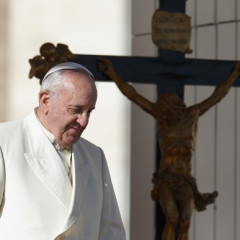
“The news coming from Iraq leaves us incredulous and appalled,” Francis told pilgrims in St. Peter’s Square on Sunday (Aug. 10), as he cataloged the brutal “violence of every kind” that has driven hundreds of thousands of people from their homes and left women and children dead and dying.
“All this seriously offends God and seriously offends humanity,” the pontiff declared. “You cannot bring hatred in the name of God. You cannot make war in the name of God!”
Yet even as Francis called on the international community to find “an efficient political solution that can stop these crimes,” the Vatican also tried to make peace with the idea that U.S. military strikes that began last week were necessary and working.
“This is something that had to be done, otherwise (the Islamic State) could not be stopped,” Archbishop Giorgio Lingua, the Vatican’s ambassador, or nuncio, to Iraq, told Vatican Radio.
Lingua was referring to the Islamic forces that have swept northern Iraq in recent weeks, killing or expelling Christians and religious minorities like the Yazidis in a horrific campaign that many consider tantamount to genocide.
The Vatican’s top official at the United Nations in Geneva, Archbishop Silvano Tomasi, also signaled the Holy See’s openness to airstrikes in a weekend interview with Vatican Radio.
Tomasi said that while reconciliation was a long-term goal, in the short run Iraq’s Christians needed “practical action” that would include “even effective military protection.”
The Vatican’s signals on military action are carefully calibrated and are coming in part because of the desperate reality on the ground and pleas from Iraqi Catholics themselves.
On Sunday, for example, Chaldean Catholic Patriarch Louis Raphael Sakoissued a statement detailing the plight of his flock and religious minorities while also calling President Obama’s decision to limit the extent of American military strikes as “disappointing.”
Sako said the U.S. needed to weaken the insurgency’s forces in Mosul and the Nineveh plain as well as around the Kurdish center of Erbil, where Obama has concentrated American efforts.
But Rome also does not want to be seen as endorsing war as a first option to achieve peace.
Back in 2003, Pope John Paul II lobbied forcefully against the American-led invasion of Iraq, and Vatican officials view today’s catastrophe as a direct result of President George W. Bush’s decision to ignore John Paul and other critics.
“From that time, the situation has never improved,” said Cardinal Fernando Filoni, who Francis is sending to Iraq on Tuesday (Aug. 12) with an unspecified “papal donation” to help the refugees.
“On the contrary, you can say so many aspects are worse,” said Filoni, who spent years in Iraq during the violent aftermath of the 2003 invasion.
Yet even as the Vatican has taken a default position against military action, church officials do not want to cut off the possibility of a “humanitarian intervention” that necessitates the use of force. That is a position that popes have embraced in the past under the principle of the“responsibility to protect” victims suffering immediate threats.
“No one here is celebrating,” one Vatican diplomat told The Boston Globe, referring to the airstrikes, “but when people are at risk, they have to be defended … that’s clear.”
Moreover, as the Globe’s Vatican expert, John Allen, wrote, if the Vatican is seen as supporting military action against Islamic fighters to protect Christians “it could be exploited for propaganda value” by radical Islamists.
It’s a delicate balance, and one that likely won’t get any easier in the coming weeks and months. But Francis seems determined to keep the Catholic Church involved in efforts to reach a resolution.
The Vatican is calling all the Holy See’s diplomats from the Middle East to Rome to discuss the worsening security situation and organize support for those who have been forced to flee the insurgents. The meeting will take place next month.
David Gibson contributed to this article.









